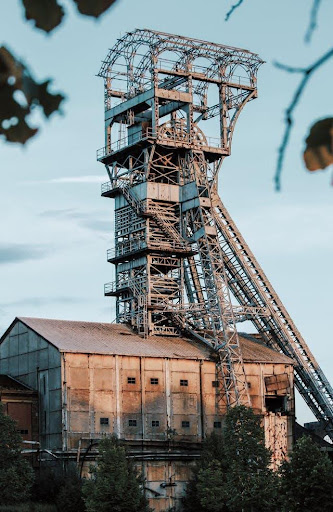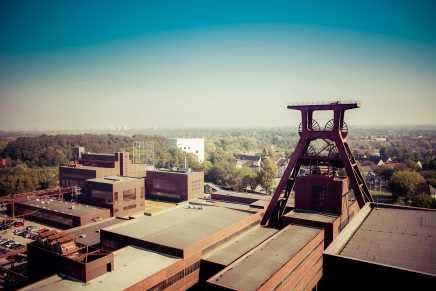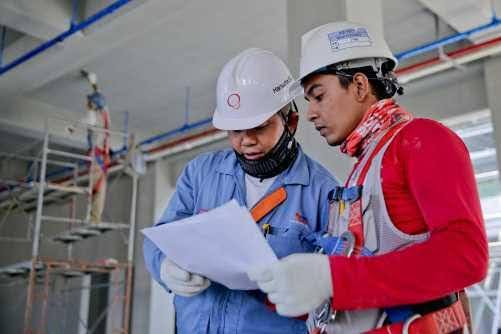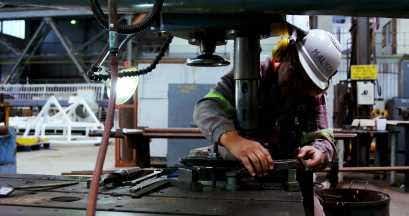AET training teaches basic skills of education to employees who need to function effectively in modern workplaces. Therefore, ABET is a vital component of the upskilling and reskilling of designations to support new technologies, systems and processes.
Nearly 95% of mining leaders surveyed by PwC in 2021 believed the mining workforce will change over the short term. There will be an inevitable transition to more skilled employees as mines increasingly mechanise and automate processes. These skilled workers may be paid more, but the resultant productivity gains will more than offset these costs. For example, technology can play a major role in improving health and safety in mines. It facilitates large digital information and analysis, enabling proactive responses to risks. Health and safety in the mining industry remains a concern. It is unlikely that it will ever be possible to achieve zero fatalities in the industry with labour-based processes. This is considering the variable conditions of underground operations and the human error factor.
Indeed, primary beneficiaries of Fourth Industrial Revolution (4IR) technologies in mining are technical operations. In addition to health and safety, they include rock engineering, survey and ventilation plus asset management, maintenance and repair. This is as mines attempt to visualise and manage operations in near real time. In this way, they can respond more quickly and “save” a shift or lost blast. Refer to https://www.pwc.co.za/en/assets/pdf/ten-insights-into-4ir-session-slide-deck.pdf.
AET training more important
AET training has never been more important. This is considering the rapid evolution of work. There is an increasing focus on automation, algorithm and a growing need to be digital savvy. According to McKinsey & Company, this will result in more than 100-million workers needing to find different occupations by 2030. Refer to https://www.mckinsey.com/industries/metals-and-mining/our-insights/has-mining-lost-its-luster-why-talent-is-moving-elsewhere-and-how-to-bring-them-back.
Adult basic training equips employees with the literacy and basic numeracy skills that are needed in modern mines. Being able to read words in documents is not enough to cope. Mine workers in this new industrial era need to be able to understand arguments; the turns of phrase; and the allusions. Problems also have to be solved; the implications of calculations assessed; and arguments put forward in everyday use of literacy. Quality adult education programmes take this into consideration. They are more than just teaching basic numeracy skills and how to read and write.
Quality AET training
Employees who complete quality AET training are functionally literate. It is one thing to be able to read and write and perform basic calculations. This is the most basic definition of literacy. Rather, employees must have an ability to apply these concepts perceptively in a complex, changing technological world.
There are four different levels of functional literacy. By the time employees have completed adult education and training, they will possess proficient literacy skills. They will, therefore, be able to read long and complex texts for meaning. Employees with basic education skills at this level can compare viewpoints in newspapers and interpret statistical graphs. They can also calculate the cost of food items by their weight. Moreover, they have learnt the foundations upon which to develop and hone important “soft” skills.
Prior to completing adult basic education and training level 4, employees had intermediate literacy skills. These were learnt during adult education and training level 3. Having successfully completed this level of adult basic education and training, employees can read long, straightforward texts for meaning. This enables them to reference information; summarise a long article; and place an order and calculate its cost.
Adult education and training levels 2 and 3 teach basic literacy skills. With these basic education skills, employees can at least read short texts with understanding. Therefore, they can make sense of a pamphlet; use a television guide; and compare ticket prices.
Employees who start adult literacy training at level 1 will learn how to read and write numbers in very simple documents. As such, they can identify information on a chart; sign a form; and add an amount to a deposit slip.
A reputable AET provider will ensure that employees transition from previous educational level attainment into a suitable ABET level.
AET will continue to evolve
AET training will continue to evolve to meet the needs of modern workplaces.
Proficient functional literacy in the 4IR is not necessarily about being able to code. Rather, it is about understanding what coding is. This is in addition to how these sophisticated technologies work and are integrated into the world of work.
An enterprising ABET provider knows that proficient functional literacy is not static. Literacy and basic numbers skills demands are constantly changing. For example, in the 1980s, employees only had to work with spreadsheets and word processors. Possessing this ability was sufficient to be considered functionally literate. Now, we use our devices to email; browsers; entertainment centres; and attend online meetings. Being able to do so is only the basics of modern digital literacy. Navigating algorithms and simulations requires even more advanced literacy and numeracy skills.
AET training for staff development
The mining industry has long recognised the importance of AET training for staff development. This is over-and-above adult basic training being an important component of mines’ social labour planning [https://www.dmr.gov.za/Portals/0/social%20and%20labour%20plan_guideline.pdf]. Adult education and training is part of the human resources development component of SLPs. It is aimed at employees who have not completed school and, therefore, have limited basic education skills. This is in addition to poor communities from where mines source their labour. The vast majority of these populations are functionally illiterate and, therefore, in dire need of adult education and training.
Mines prefer to outsource the provision of English and maths training to an accredited training provider. This ensures that employees are equipped with basic education skills and “soft” skills quickly and efficiently.
The Mine Qualifications Authority is the Sector Education Training Authority that administers and develops learning programmes for the industry. Refer to MQA – Mining Qualifications Authority and https://nationalgovernment.co.za/units/type/8/seta.
It was born out of the Mine Health & Safety Act in January 1997. Refer to Mine Health and Safety Act 29 of 1996 | South African Government (www.gov.za).
In March 2000, it was designated a SETA. The Minerals Council serves on the MQA Board as an Accounting Authority. Refer to Home – Minerals Council South Africa.
Investing in quality AET training
Investing in quality AET is in line with the requirements of the Mining Charter. Refer to Mining Charter III – what you need to know about the final version published | Webber Wentzel.
It requires that mining companies invest 5% of their annual leviable payroll into skills education development of employees or communities. This sum does not include the 1% skills levy that companies are required to contribute.
The MQA receives 80% of the 1% skills levies that companies contribute. Meanwhile the National Skills Fund receives the remaining 20%. Refer to National Skills Fund (NSF) – Overview (nationalgovernment.co.za).
The MQA portion is divided into legislated amounts for administration and Quality Council for Trades & Occupations. Refer to [QCTO Home of skills assurance]. This is in addition to mandatory and discretionary grants. Mining companies can also attract discretionary grants from the MQA for specific learning programmes.
In 2017, alone, the mining industry invested about R6-billion on skills development. This included on basic education development for employees. ABET training continues to be a mainstay of skills development offerings in the mining industry. Notably, the number of learners entering adult education and training programmes has been steadily declining. This is an indication of the improvement in the basic education skills and “soft” skills levels of mining employees.
However, the inability of the South African mining industry to attract many of the unemployed youth is telling. It simply means that many of these job seekers do not have the skills that are needed by modern mines. Refer to https://m.engineeringnews.co.za/print-version/minings-inability-to-absorb-youth-raises-questions-about-its-sustainability-2023-06-16.
Skills at AET level 4
To perform optimally in future mines, workers will at least need basic education skills at an ABET level 4. This is the bear minimum in terms of literacy and basic numbers skills.
To date, rock-drill operators, for example, have only required literacy and basic numeracy skills at an AET level 3. This was sufficient to learn for a blasting certificate. However, considering rapid advances in the field, higher basic education skills will soon be needed to pursue this career. These skills complement other important qualifications that rock-drill operator will hold. This includes a MQA Competent Person – B (Skills Programme Certificate. Refer to https://www.mqa.org.za/wp-content/uploads/2022/08/Accredited-Training-Providers-04-AUGUST-2022.pdf. Moreover, rock-drill operators needs to be in possession of a Basic Health and Safety Practice certificate [https://mqa.org.za/occupational-health-and-safety/]. They also need to hold a Generic Mine Stope and Development Safe Operating Methods, Procedures and Skills qualification. Refer to https://regqs.saqa.org.za/showQualification.php?id=58760. This is in addition to other important certificates. They include Generic Mine Policies and Procedures; Blasting Assistant; and Rock Drill Operator certificates. This is in addition to a Fitness and First Aid Safety Trade Certificate.
Rock drill operators perform a critical role in the mining industry. They accurately drill explosive charge holes to enable blasting so that rock can be removed. Furthermore, these employees are responsible for ensuring the effective functioning, storage, transport and maintenance of their equipment. The first phase in the mining cycle, drilling and blasting has a bearing on operations further downstream. Training for staff development is, therefore, critical to ensure optimal rock-drilling operations.
Numbers skills learnt during AET

The basic numbers skills learnt during AET training are the basis of the technical proficiencies needed to perform this job. Competent rock-drill operators deliver on target, which includes all important measurables, namely safety, cost, production and grade. They possess a sound understanding of mechanised drill operation and mechanical knowledge such as design, application, maintenance and repair. This is in addition to the processes involved in correctly drilling and installing roof bolts and charging shot holes. Moreover, these workers assist with the construction of temporary supports. They regulate and monitor equipment and help with face preparation. In addition, they have a sound knowledge of explosives and charging up operations. Importantly, they complete their daily tasks while complying with regulations. This also entails a sound understanding of the implementation of and adherence to fatal-risk protocol.
Basic education skills are also the foundation of the many “soft” skills that these employees need to do their jobs. For example, they need to be able to report targets, service records, concerns and areas of impact. This is undertaken via various mediums and levels using communication skills.
Employees who have completed all four levels of AET training can also problem solve. Moreover, they possess consequential thinking and management skills, while also being adaptable and flexible. They are also aware of hazards and can identify, assess and manage risk on their own. Furthermore, these employees can collaborate as a team and effectively manage resources, materials and equipment. They are also aligned to the organisation’s culture and values and can support the company’s strategy. This includes important mining modernisation, detrimental to the sustainability of this industry.
AET develops digital literacy
Importantly, AET training develops the basis of digital literacy skills.
Rock drill operators who have completed English and maths training can use electronic devices. This is in addition to applicable job-related software programmes to operate rock drill technologies. They can also interface with and analyse data, as well as use it in an ethical manner. Moreover, they possess important basic data analytics skills. This includes the ability to condense and distribute the correct information. In addition, they have a basic understanding of virtual collaboration or “teaming”.
AET geared at winch operators
AET is also geared at imparting the basic education skills that modern winch operators need to perform at optimal levels.
Currently, they also only need literacy and numeracy skills at AET training level 3 to learn for a blasting certificate. However, this may not be sufficient moving forward. There is a high probability that future winch operators will need basic education skills at a NQF Level 1. Refer to https://www.saqa.org.za/wp-content/uploads/2023/02/Fact-Sheet-SAQA-FPI.pdf.
Certainly, they will also have to hold a number of other qualifications in addition to a blasting certificate. These are very similar to those of rock-drill operators.
Winch operators remove broken rock with a scraper winch. However, the position also entails pre- and post-removal activities. Among others, these include tools and equipment storage and report submission. This is in addition to liaising with engineering personnel for maintenance, repair and function outputs.
The basic education skills learnt during ABET are the basis of the hard proficiencies needed to perform this job well. Competence is also measured by the ability to deliver on target. This is defined by important measurables, not least of which are safety, cost, production and grade.
ABET training underpins “hard” skills

Again, ABET training also underpins the technical or “hard” skills that these employees need to be proficient in their jobs.
They include mechanical knowledge, such as design and application, as well as repair and maintenance. Moreover, winch operators perform routine maintenance on equipment. This includes determining when it needs to be undertaken and the types of maintenance requirements that must be done. In addition, winch operators need to troubleshoot to determine the causes of operating errors. They also need sound knowledge of the principles and methods for moving goods. This includes an understanding of scraper paths and proximity influences. Importantly, competent winch operators perform their duties while always adhering to regulations. This also entails a sound understanding of fatal risk protocol.
These “hard” and “soft skills” are complemented by the foundations of digital literacy imparted basic education for employees.
ABET prepares employees
ABET also prepares employees to become highly adept shaft-timber personnel. With basic education skills at a NQF Level 1, employees can learn for a Grade 12 Senior Certificate [https://www.education.gov.za/Curriculum/NationalSeniorCertificate(NSC)Examinations.aspx]. This is considering that the shaft-timber “people” need literacy skills at a NQF Level 4. It is an important level as it denotes a basic understanding of a subject area. This is in addition to the acquisition of basic education skills and knowledge. For this reason, it serves as a stepping stone to higher levels of education and training. Refer to https://www.icb.org.za/benefits-of-an-nqf/#:~:text=This%20level%20of%20qualification%20usually,levels%20of%20education%20and%20training.
Moreover, these employees will hold a relevant Certificate of Competency, namely “Competent person – B”. This is in addition to an assistant blasting; valid fitness (Red Ticket); and Safety Trade Certificate.
These employees provide an indispensable service in mines. They examine roofs and side walls of haulage ways; air passages; shafts; and galleries. Thereafter, they erect timber or steel props and frames. This is in addition to undertaking basic construction and maintenance work at the shaft and its many workstations. Moreover, they conduct inspections and maintenance within the shaft barrel. This includes steelwork, in addition to the installation of supports and brackets. Shaft-timber “people” are also responsible for controlling blasting according to safety procedures and standards.
In addition to these technical proficiencies, these workers also need “soft” and digital skills. These are similar to those used by rock drill and winch operators.
Mines’ preferred AET training partner
Triple E Training has remained mines’ preferred AET training partner for many years.
For more than three decades, we have kept pace with constantly changing literacy and numeracy demands of our clients.
Importantly, we are a work-based learning provider. Therefore, we provide onsite-based training for employees, planning adult basic training around production schedules. This includes the provision of adult literacy training and numeracy as part of a comprehensive training for staff development package.
Learn more about Triple E Training and our quality adult literacy and numeracy training programmes. www.eee.co.za


